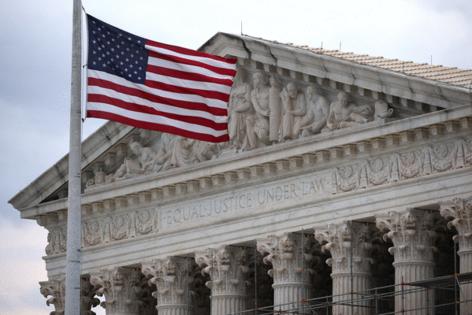Supreme Court blocks deportation of Venezuelans from Texas
Published in Political News
A divided Supreme Court temporarily blocked President Donald Trump’s administration from deporting a group of Venezuelans, granting them a reprieve from being imminently sent to a notorious prison in El Salvador.
The order, issued around 1 a.m. Saturday in Washington, came after detainees filed urgent requests in four courts to block their deportation from the Bluebonnet Detention Center in Anson, Texas. Lawyers for the men said they were being put on buses and told they would be deported as early as Friday afternoon.
The Supreme Court order for now bars the government from using a wartime law to expel alleged Venezuelan gang members. The court said the pause applies “until further order of this court,” indicating the justices will take additional action after the Trump administration files its response.
Justices Clarence Thomas and Samuel Alito dissented, with Alito saying he will issue an opinion on the matter later.
The showdown marks a fresh escalation in Trump’s campaign to circumvent the federal judiciary as he tries to implement a torrent of far-reaching policies, including mass deportations. Trump last month sent more than 200 alleged gang members to the Salvadoran prison, even as a judge verbally ordered that two planes turn around.
“President Trump promised the American people to use all lawful measures to remove the threat of terrorist illegal aliens, like members of TdA, from the United States. We are confident in the lawfulness of the administration’s actions and in ultimately prevailing,” White House Press Secretary Karoline Leavitt said Saturday.
The Supreme Court’s intervention comes 12 days after the justices said accused Tren de Aragua gang members must get a “reasonable time” to challenge their deportation in federal court. Many of the detainees say they aren’t gang members, and they contend Trump can’t deport them by invoking the 1798 Alien Enemies Act, a law that previously had been used only in wartime. The Supreme Court hasn’t resolved whether Trump’s use of that law is legal.
Friday flurry
The flurry of activity in the case included an emergency hearing Friday evening before U.S. District Judge James Boasberg in Washington, where a Justice Department lawyer said no deportation flights were planned for that night or Saturday.
Separately on Friday, District Judge James Hendrix in the Northern District of Texas declined to halt the deportations, saying he needed more time to weigh “matters of such importance and complexity.” The 5th U.S. Circuit Court of Appeals, based in New Orleans, then refused to intervene.
Boasberg said that because the men are detained in Texas, he doesn’t have authority to rule on the dispute.
“At this point, I just don’t think I have the power to do anything about it,” Boasberg told lawyers from the American Civil Liberties Union representing the men.
At the hearing, Justice Department lawyer Drew Ensign said he had spoken with officials at the Department of Homeland Security, who said that while there were no plans to deport people Saturday, they “reserve the right to remove people.”
ACLU lawyer Lee Gelernt said: “That doesn’t give us confidence there won’t be planes.”
‘No real opportunity’
Lawyers for the men told the Supreme Court that without judicial intervention, potentially hundreds of people “may be removed to a possible life sentence in El Salvador with no real opportunity to contest their designation or removal.”
The detainees allegedly had been given an English-only notice that didn’t explain how they could contest their deportation or how much time they had to do so.
“The notice the government is providing does not remotely comply with the Supreme Court’s order,” lawyers for the men said in their filing to the justices.
The U.S. accused one man, referred to as A.A.R.P., of having “tattoos and associates that indicate gang membership,” according to the complaint filed in Texas. Another man, called W.M.M., was alleged to be affiliated with the gang based on emojis in his social media feed and a social media comment by someone else, it said.
Boasberg on March 15 unsuccessfully ordered the government to turn around planes that were carrying people to the Salvadoran prison without first getting judicial review of their cases.
At the hearing Friday, Gelernt said many of the men were moved to Bluebonnet after a judge in a different part of Texas issued a temporary order barring their deportations. Judges in Colorado and New York have also issued similar orders.
Ensign said they had been moved there from all over the U.S. Gelernt said lawyers for the men would file petitions in all 94 judicial districts in the U.S.
Asked earlier Friday about whether he had authorized the operation, Trump said: “I don’t know about the group you’re talking about, but if they’re bad people, I would certainly authorize it, yeah.”
Separately, a federal appeals court in Washington on Friday temporarily blocked Boasberg from starting criminal contempt proceedings stemming from the March 15 events.
The administrative stay gives the appeals court more time to consider how it will handle Boasberg’s conclusion that government officials showed “willful disregard” toward his order. The three-judge panel laid out a briefing schedule that concludes next Friday.
The Supreme Court case is A.A.R.P. v. Trump, 24A1007.
———
(With assistance from Hadriana Lowenkron.)
©2025 Bloomberg L.P. Visit bloomberg.com. Distributed by Tribune Content Agency, LLC.




























































Comments